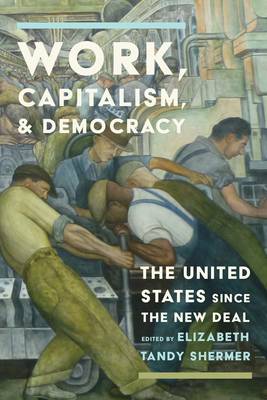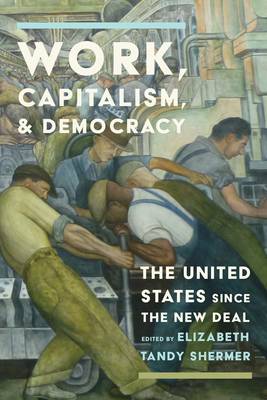
- Afhalen na 1 uur in een winkel met voorraad
- Gratis thuislevering in België vanaf € 30
- Ruim aanbod met 7 miljoen producten
- Afhalen na 1 uur in een winkel met voorraad
- Gratis thuislevering in België vanaf € 30
- Ruim aanbod met 7 miljoen producten
Zoeken
Work, Capitalism, and Democracy
The United States Since the New Deal
€ 79,45
+ 158 punten
Omschrijving
A collection of essays exploring the meaning of work, capitalism, and democracy in the past to shed light on the same conflicts today
Changes to the meaning and nature of work, capitalism, and democracy during and after the New Deal have been contested from the mid-twentieth century to the present day. Rather than rehashing the familiar, tidy story of a Democratic coalition coming together in the 1930s only to be felled by conservative movements in the 1970s, this volume instead emphasizes that the prosperity many white American families enjoyed did not stop the fights over whose work would be recognized, how corporations would be regulated, and whose democratic rights would be protected, both on and off the job. Cultural representations of the ideal worker, legal battles over workplace rights, political standoffs over inflation policies, dire warnings against too much regulation, and abuses of the tax code indicate there never really was a consensus on how democratic the country, its economic system, and its workplaces would be. As the collected essays suggest, backlash does not seem the right word to describe the challenges left-leaning politicians, environmental activists, and immigrants faced in the late twentieth century, when managing supply chains became far more lucrative than manufacturing the goods being shipped around the world. Using the broad categories of work, capitalism, and democracy to reinterrogate the past, contributors contend, is the only way to understand today's conflicts over the future of how Americans will work, how capitalism will function, and how the country will be governed. Contributors: Carl J. Bon Tempo, Daniel Geary, Shane Hamilton, Meg Jacobs, Nelson Lichtenstein, Reuel Schiller, Elizabeth Tandy Shermer, Lauren Rebecca Sklaroff, Samir Sonti, Joseph J. Thorndike, Jean-Christian Vinel, Leandra Zarnow.Specificaties
Betrokkenen
- Uitgeverij:
Inhoud
- Aantal bladzijden:
- 320
- Taal:
- Engels
- Reeks:
Eigenschappen
- Productcode (EAN):
- 9781512828719
- Verschijningsdatum:
- 3/02/2026
- Uitvoering:
- Hardcover
- Formaat:
- Genaaid
- Afmetingen:
- 152 mm x 229 mm
- Gewicht:
- 598 g

Alleen bij Standaard Boekhandel
+ 158 punten op je klantenkaart van Standaard Boekhandel
Beoordelingen
We publiceren alleen reviews die voldoen aan de voorwaarden voor reviews. Bekijk onze voorwaarden voor reviews.







